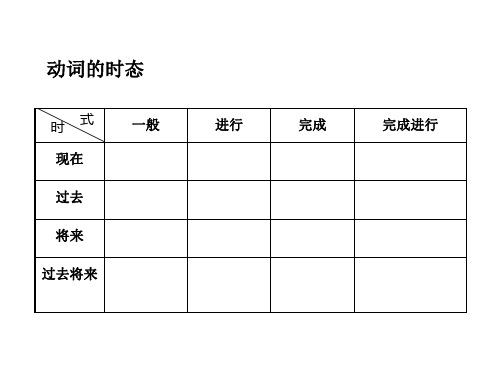英语时态PPT课件
合集下载
英语时态8种基本时态讲解.ppt课件

4)动词过去式变化规则。 a)一般情况下的词加-ed. work---worked call----called b)以不发音的字母e结尾的单词直接加-d . live----lived change----changed smoke----smoked die----died graduate----graduated drive----drove
8.过去完成时 表示动作发生在过去某一时间之前已经完成的动作或状态, 强调“过去的过去”, 常与 by the time, by the end of…,before , by 等引导时间的状语连用。
基本结构 主语+ had + 动词过去分词 + 其他成分 When I got to the cinema yesterday the film had begun already. He had learned English before he came here.
现在完成时与一般过去时的区别: 1)现在完成时侧重于对现在的影响;而一般过去时侧重于某一动作发生在过去某个时间或某段时间。即现在完成时侧重于现在的结果,而一般过去时侧重于动作发生的时间。例如:
I have seen the film. 我看过这部电影。(现在我仍记得电影的内容) I saw the film three days ago. 三天前我看了这部电影。(强调是三天前,而不是别的什么时候看的电影)
be going to含有“打算,准备”的意思,而will则没有这个意思, She is going to lend us her book. He will be here in half an hour.
be about to+V.原形(意为马上做某事,在时间上指最近的将来) I am about to leave school. 不能与表示时间的副词连用。 They are about to set out.(√) They are about to set,变y为i加-ed. study----studied carry----carried cry----cried try----tried d)以元音字母+y结尾的单词直接加-ed. play----played stay----stayed
8.过去完成时 表示动作发生在过去某一时间之前已经完成的动作或状态, 强调“过去的过去”, 常与 by the time, by the end of…,before , by 等引导时间的状语连用。
基本结构 主语+ had + 动词过去分词 + 其他成分 When I got to the cinema yesterday the film had begun already. He had learned English before he came here.
现在完成时与一般过去时的区别: 1)现在完成时侧重于对现在的影响;而一般过去时侧重于某一动作发生在过去某个时间或某段时间。即现在完成时侧重于现在的结果,而一般过去时侧重于动作发生的时间。例如:
I have seen the film. 我看过这部电影。(现在我仍记得电影的内容) I saw the film three days ago. 三天前我看了这部电影。(强调是三天前,而不是别的什么时候看的电影)
be going to含有“打算,准备”的意思,而will则没有这个意思, She is going to lend us her book. He will be here in half an hour.
be about to+V.原形(意为马上做某事,在时间上指最近的将来) I am about to leave school. 不能与表示时间的副词连用。 They are about to set out.(√) They are about to set,变y为i加-ed. study----studied carry----carried cry----cried try----tried d)以元音字母+y结尾的单词直接加-ed. play----played stay----stayed
初中英语六种时态复习课件(35张PPT)

②while 引导的从句表示“在……期间”,主从句谓语动词所表示的动 作同时ቤተ መጻሕፍቲ ባይዱ生。这时,主从句都用过去进行时。
e.g.:My father was reading the newspaper while my mother was watching TV.当我的妈妈看电视的时候,我的爸爸正在看报纸。
(2)表示普遍真理或客观事实。 e.g.:The sun rises in the east.太阳从东方升起。 (3)在条件状语从句和时间状语从句中,用一般现在时表示将来。 e.g.:If it doesn't rain tomorrow,we will go for a picnic.如果明天不下 雨,我们将去野餐。 (4)在某些以 here,there 开头的句子中用一般现在时表示正在发生的动作。 e.g.:There goes the bell.铃响了。
(3)现在进行时表示将来 表示位置移动的动词 go,come,leave,fly,start,meet,move 等, 可以用现在进行时表示将要发生的事。 e.g.:We are leaving for London.我们就要动身去伦敦了。
(4)一般现在时表示将来 ①表示按规定或时间表预计要发生的动作。 e.g.:Our plane takes off at 8:10.我们的飞机 8:10 起飞。 ②当主句为一般将来时,或含有情态动词,或是祈使句时,在 if,as soon as,until,when 等引导的状语从句中用一般现在时表示将来。 e.g.:I will give him the book as soon as he comes here.他一来这儿, 我就把这本书给他。
(2)表示当前一段时间内的活动或现阶段正在进行的动作。 e.g.:They are picking apples on a farm all the time.他们一直在农场 摘苹果。 (3)与 always,usually 等词连用,表达说话人强烈的感情,如赞扬、不 满、讨厌等。 e.g.:Mary is always thinking of others instead of herself.玛丽总是为 别人着想,而不为自己着想。
高中英语时态全版.ppt

Tom is seeing his friend off at the airport.
.精品课件.
16
过去进行时 表示过去某一时刻或某一段时间内正在进行 的动作。这一特定的过时间可用时间状语表 示
He was watching TV when I came in.
---What were you doing this time yesterday? ---I was writing a letter.
I will study hard to keep up with my classmates.
He won’t do it.
You shall have the book.
.精品课件.
8
2.be going to + 动词原形:含有打算、计划、 准备将做某事的意思,或表示很有可能要发 生的事。
3.若表示已安排或计划好的将来动作或存 在状态,可用一般现在时代替一般将来 时,其谓语动词常为be, come, go, arrive, leave, start等
Where shall we meet tomorrow?
.精品课件.
7
注:shall和will除了上述表示单纯的将来外, 还有其他用法。在第一人称后,will常表示 “决心”、“意愿”或“打算”,在否定
句中用于所有人称,有“不愿”的意思。 shall用于第二人称时,可表示说明者的将 来意愿或允诺。
the window.)
.精品课件.
4
7. 由here, there开头的句子,动词 用一般现在时表示正在发生的动 作。如:
There goes the bell.
Here comes the teacher.
八大时态讲解(共26张PPT)

He is going to buy her some flowers.
0 一般过去将来时:
He was sixty-eight. In two years he would be seventy.
I knew you would agree.
0 现在英进行语时的: 动词时态(进行) What are you doing?
算;
如:I am going to listen to music. (我打算听音乐) will /shall 表示未事先思考或为计划过的意图
如:It will be Christmas soon .(很快就圣诞节了)
4. 现在进行时态( The Present Continuous Tense )
5、我们离开广州六年了。
We have left Guangzhou for 6 years . ×
We have been away from Guangzhou for 6
years .
3.常见句型
1) 主句(现在完成时)+since 从句(一般过去时).
2) It is +一段时间+ since 从句(一般过去时).
has gone to
He said had seen this morning, …ago, etc
that he _________the film many 如果明天不下雨,我们将去野营。
He has borrowed the pen for three days .
times. 现在进行时态( The Present Continuous Tense )
was /were going to +动词原形
0 一般过去将来时:
He was sixty-eight. In two years he would be seventy.
I knew you would agree.
0 现在英进行语时的: 动词时态(进行) What are you doing?
算;
如:I am going to listen to music. (我打算听音乐) will /shall 表示未事先思考或为计划过的意图
如:It will be Christmas soon .(很快就圣诞节了)
4. 现在进行时态( The Present Continuous Tense )
5、我们离开广州六年了。
We have left Guangzhou for 6 years . ×
We have been away from Guangzhou for 6
years .
3.常见句型
1) 主句(现在完成时)+since 从句(一般过去时).
2) It is +一段时间+ since 从句(一般过去时).
has gone to
He said had seen this morning, …ago, etc
that he _________the film many 如果明天不下雨,我们将去野营。
He has borrowed the pen for three days .
times. 现在进行时态( The Present Continuous Tense )
was /were going to +动词原形
英语八大时态PPT课件(详细版)

b
15
He is a lazy man . He ____the dirty jeans every day.(2014 )
A. always wears B. always wearing C. always to wear D. is always wearing
You will know the truth after you ___him.(2013) A. see B. will see C. are seeing D.to see
b
16
三、一般过去时
1、构成 一般过去时用动词的过
去式表示。除系动词be的过去式 有人称和数的变化外,其他动词 的过去式无人称和数的变化。
b
17
2、用法
※表示过去已经发生的动作,现在 已经结束,常与相应的过去时间状 语连用。 Tom fell ill last night , and he had to stay at home.
【翻译】
我今年20岁,住在北京。 I am twenty years old this year , and I live in Beijing.
火车将在一个小时后(in an hour)出发(set off)。 The train sets off in an hour.
她每天都走路上学。 She walks to school every day. 或:She goes to school on foot every day.
If it doesn’t rain tomorrow,we’ll
go shopping.
பைடு நூலகம்
b
6
常与一般现在时连用的时间状语有:
often 经常
英语八大时态PPT课件(详细版)

come)
The perfect tense is formed by combining the presentation
particles of the verb with have or has (e.g., he has gone, she has come)
The Composition of the Eight Tenses in English
03
Examples
I have studied, They have played, He has written
Present simple tense
Definition
The present simple tense is used to express an action that is verbal, generic, or not emphasizing time
VS
Tense can be classified into two categories: simple tense and complex tense Simple tense includes present, past, and future tense, while complex tense includes the perfect, the superior, the future perfect, and the conditional perfect tense
Conditional Perfect Tense
It is used to express actions or events that would have been completed in the past if a condition had been met
The perfect tense is formed by combining the presentation
particles of the verb with have or has (e.g., he has gone, she has come)
The Composition of the Eight Tenses in English
03
Examples
I have studied, They have played, He has written
Present simple tense
Definition
The present simple tense is used to express an action that is verbal, generic, or not emphasizing time
VS
Tense can be classified into two categories: simple tense and complex tense Simple tense includes present, past, and future tense, while complex tense includes the perfect, the superior, the future perfect, and the conditional perfect tense
Conditional Perfect Tense
It is used to express actions or events that would have been completed in the past if a condition had been met
英语十六种时态ppt课件

He went swimming yesterday. 昨天他去游泳了。 He was ill yesterday. 他昨天病了。
6
2.一般过去时的肯定、疑问、否定三种形式
肯定式
疑问式
否定式
I worked.
Did I work?
I did not work.
He (She, It)worked. Did he (she, it) work? He (She, It) did not work.
13
范围扩展
1. 用过去进行时表示现在主要是为了使语气委婉、客气。 I was wondering if you can give me a lift. 我不知你能否让我搭一下车。 (一般过去时也有类似用法,但比较而言,用过去进
行时显得更客气,更加不肯定。)
2.动词be的过去进行时也可表示过去一时的表现或暂时的 状态。
现在进行时表示说话时正在进行的动作或表示目前一段时 间内正在进行的活动,与现在进行时连用的时间状语有now, these days等。
—What is your mother doing now? 你的妈妈正在干什么? —She is cooking for us. 她正在为我们做饭。 2.现在进行时的具体用法
10
用法
例句
(1) 说话瞬间正在发生的动作,常见的时间 They are watching TV now.
状语有now,at the moment等。如果句首有 他们现在正在看电视。
警示性动词look,listen等,主句的动词也 Listen! The bird is singing in the tree.
(2) be (am, is, are) going to + 动词原形 2.一般将来时的用法
6
2.一般过去时的肯定、疑问、否定三种形式
肯定式
疑问式
否定式
I worked.
Did I work?
I did not work.
He (She, It)worked. Did he (she, it) work? He (She, It) did not work.
13
范围扩展
1. 用过去进行时表示现在主要是为了使语气委婉、客气。 I was wondering if you can give me a lift. 我不知你能否让我搭一下车。 (一般过去时也有类似用法,但比较而言,用过去进
行时显得更客气,更加不肯定。)
2.动词be的过去进行时也可表示过去一时的表现或暂时的 状态。
现在进行时表示说话时正在进行的动作或表示目前一段时 间内正在进行的活动,与现在进行时连用的时间状语有now, these days等。
—What is your mother doing now? 你的妈妈正在干什么? —She is cooking for us. 她正在为我们做饭。 2.现在进行时的具体用法
10
用法
例句
(1) 说话瞬间正在发生的动作,常见的时间 They are watching TV now.
状语有now,at the moment等。如果句首有 他们现在正在看电视。
警示性动词look,listen等,主句的动词也 Listen! The bird is singing in the tree.
(2) be (am, is, are) going to + 动词原形 2.一般将来时的用法
英语语法16种时态介绍ppt课件

I'll write to you as soon as I arrive there. • 由if 引导的条件状语从句中可以用shall或will表
“意愿”,但不表示时态。
If you will accept my invitation and come to our party, my family will be pleased.如果你愿意接受并 参加我们的舞会,我的家人会非常高兴。
6)祈使句中 ( to give directions or instructions ) Go down the street, and then take the second turning on
the left.
知识扩展:一般现在时表将来
1)下列动词:come, go, arrive, leave, start, begin, return的一般 现在时表将来。这主要用来表示在时间上已确定或安排好的 事情 ( timetabled or fixed events )。 The train leaves at six tomorrow morning. When does the bus start? It starts in ten minutes.
You are always changing your mind. You are always doing well
He’s always asking the same question. 6. 状态动词的进行时后面接形容词brave; careful; stupid; clever; foolish; polite; kind; shy等时,为 主语所表现的非一般惯性特点或故意的行为。
6 )在the more…the more…句型中,从句也要用一 般现在时取代将来时。
“意愿”,但不表示时态。
If you will accept my invitation and come to our party, my family will be pleased.如果你愿意接受并 参加我们的舞会,我的家人会非常高兴。
6)祈使句中 ( to give directions or instructions ) Go down the street, and then take the second turning on
the left.
知识扩展:一般现在时表将来
1)下列动词:come, go, arrive, leave, start, begin, return的一般 现在时表将来。这主要用来表示在时间上已确定或安排好的 事情 ( timetabled or fixed events )。 The train leaves at six tomorrow morning. When does the bus start? It starts in ten minutes.
You are always changing your mind. You are always doing well
He’s always asking the same question. 6. 状态动词的进行时后面接形容词brave; careful; stupid; clever; foolish; polite; kind; shy等时,为 主语所表现的非一般惯性特点或故意的行为。
6 )在the more…the more…句型中,从句也要用一 般现在时取代将来时。
- 1、下载文档前请自行甄别文档内容的完整性,平台不提供额外的编辑、内容补充、找答案等附加服务。
- 2、"仅部分预览"的文档,不可在线预览部分如存在完整性等问题,可反馈申请退款(可完整预览的文档不适用该条件!)。
- 3、如文档侵犯您的权益,请联系客服反馈,我们会尽快为您处理(人工客服工作时间:9:00-18:30)。
过去将来完成时 过去将来完成进行时 should should have studied have been studying would would
现在
过去
时 态
将来 高考题 巩固 题1
巩固 题2
主动
语 态
被动
一般现在时 现 在 现在进行时 现在完成时
一般现在时
goes around the sun when I I learned that the earth ___ was in primary school. 考点一:表示永恒的真理,即使出现在过去的语境中,仍 用一般现在时。 If he accepts the job, he will get more money soon. 考点二:在时间和条件状语从句中,代替一般将来时;常 用的引导词有: 时间:when, until, after, before, as soon as, once, the moment/the minute; Eg: When Bill comes (不是will come), ask him to wait for me. 条件:if, unless, provided.
since的四种用法 1) since +过去一个时间点 (如具体的年、月、日期、钟 点、1980, last month, half past six)。 I have been here since 1989. 2) since +一段时间+ ago
I have been here since five months ago.
现在完成时
考点一:for + 时间段;since + 时间点 They have lived in Beijing for five years. They have lived in Beijing since 1995.
考点二:常见的不确定的时间状语:lately; recently, just, already, yet, ever, never, up to now; till now; so far, these days, once, twice, three times… Has it stopped raining yet ? 考点三:在表示“最近几世纪/ 年/ 月以来……”时间状语 中,谓语动词用现在完成时。 in/ over / during the past few years/months/weeks/days; for the last few centuries, through centuries; throughout history 等
考点二: 表示在最近按计划或安排要进行的动作 ,仅限 于少量动词:go, come ,leave , start , arrive , return , stay , do, have, see sb off …
Are you staying here till next week? How are you getting on with your 工作进行的怎么样? work? 工作进行的相当顺利。 The work is going fairly smoothly. 你进步很快。 You‟re making rapid progress. 我们想在这里建一座 We‟re thinking of building a dam 水坝。 here. 风挺大 It‟s blowing hard. 有人找你接电话。 Someone is asking for you on the phone.
现在进行时
being built The house is _____________these days.
The little boy is always making trouble.
考点一:与频率副词,如always,constantly, continually等连用表示说话人的某种感情色彩(赞叹、 厌烦、埋怨等)。 He is always thinking of his work (赞许) 他老是把东西乱扔。 He is constantly leaving his things about.(不满) 他老爱说大话。 He is always boasting (厌烦)
Tense & voice
时态的种类
英语动词有16种时态,现以study为例,列表如下:
体(form) 时(time)
一般时 indefinite
一般现在时 study studies
进行时 continuous
现在进行时 am is are was studying
完成时 perfect
现在完成时 have studied has
完成进行时 perfect contห้องสมุดไป่ตู้nuous
现在完成进行时 have been has studying
现在 present
过去 past 将来 Future
过去将来 Future in the past
一般过去时
studied
过去进行时
studying were
过去完成时
had studied
Tom has written a letter to his parents last night. (错)
Tom wrote a letter to his parents last night.
答案A. 等待的动作由过去开始,持续到现在,应用现 在完成时。
一般过去时 过 去 过去进行时 过去完成时
一般过去时的考点分析(考核重点)。 ①表示过去的事情、动作或状态常与表示过去具体的时间 状语连用(或有上下文语境暗示);用于表达过去的习惯; 表示说话人原来没有料到、想到或希望的事 I met her in the street yesterday. He used to smoke a lot. I thought the film would be interesting, but it isn’t. read He told me he ________an interesting novel last night . ②如果从句中有一个过去的时间状语,尽管从句中的动作 先于主句发生,但从句中的谓语动词用过去式。
过去完成进行时
had been studying
一般将来时 shall study will
过去将来时 should study would
将来进行时 shall be studying will
过去将来进行时 should be studying would
将来完成时 将来完成进行时 shall shall have studied have been studying will will
典型例题 1. You don„t need to describe her. I ___ her several times. A. had met B. have met C. met D. meet 答案B. 首先本题后句强调对现在的影响,我知道她的 模样,你不用描述。再次,several times告知为反复发 生的动作,因此用现在完成时。 2.---I„m sorry to keep you waiting. ---Oh, not at all. I ___ here only a few minutes. A. have been B. had been C. was D. will be
3) since +从句 Great changes have taken place since you left. 4) It is +一段时间+ since从句 It is two years since I became a postgraduate student.
他去过北京。
He has been to Beijing.
If you will accept my invitation, my family will be pleased. 注意:由if 引导的条件状语从句中可以用shall或will表 “意愿”,但不表示时态。 1)The train ______at leaves six tomorrow morning. starts When does the bus start? It ______in ten minutes. 考点三:下列动词:come, go, arrive, leave, start, begin, return,open , close的一般现在时表将来。这主要用来表 示在时间上已确定或安排好的事情。 2)倒装句(由here,there开头的句子,动词用一般 现在时表示现在正在发生的动作) Here comes the bus. = The bus is coming. There goes the bell. = The bell is ringing.
C. ever, come
D D. ever, have come
注意:非延续性动词的否定形式可以与表示延续时间的 状语连用。即动作不发生的状态是可以持续的。 (错)I have received his letter for a month. (对)I haven't received his letter for almost a month
注意:下面四类动词不宜用现在进行时。
(A)表示心理状态、情感的动作:like, love, hate, care, remember, believe, want, mind, wish, agree, mean, need。 (B)表存在的状态的动词:appear, exist, lie, remain, seem, belong to,depend on。 (C)表示一时性动作的动词:allow, accept, permit, promise, admit, complete。 (D)表示感官的动词:see, hear, notice, feel, smell, sound, taste, look。
现在
过去
时 态
将来 高考题 巩固 题1
巩固 题2
主动
语 态
被动
一般现在时 现 在 现在进行时 现在完成时
一般现在时
goes around the sun when I I learned that the earth ___ was in primary school. 考点一:表示永恒的真理,即使出现在过去的语境中,仍 用一般现在时。 If he accepts the job, he will get more money soon. 考点二:在时间和条件状语从句中,代替一般将来时;常 用的引导词有: 时间:when, until, after, before, as soon as, once, the moment/the minute; Eg: When Bill comes (不是will come), ask him to wait for me. 条件:if, unless, provided.
since的四种用法 1) since +过去一个时间点 (如具体的年、月、日期、钟 点、1980, last month, half past six)。 I have been here since 1989. 2) since +一段时间+ ago
I have been here since five months ago.
现在完成时
考点一:for + 时间段;since + 时间点 They have lived in Beijing for five years. They have lived in Beijing since 1995.
考点二:常见的不确定的时间状语:lately; recently, just, already, yet, ever, never, up to now; till now; so far, these days, once, twice, three times… Has it stopped raining yet ? 考点三:在表示“最近几世纪/ 年/ 月以来……”时间状语 中,谓语动词用现在完成时。 in/ over / during the past few years/months/weeks/days; for the last few centuries, through centuries; throughout history 等
考点二: 表示在最近按计划或安排要进行的动作 ,仅限 于少量动词:go, come ,leave , start , arrive , return , stay , do, have, see sb off …
Are you staying here till next week? How are you getting on with your 工作进行的怎么样? work? 工作进行的相当顺利。 The work is going fairly smoothly. 你进步很快。 You‟re making rapid progress. 我们想在这里建一座 We‟re thinking of building a dam 水坝。 here. 风挺大 It‟s blowing hard. 有人找你接电话。 Someone is asking for you on the phone.
现在进行时
being built The house is _____________these days.
The little boy is always making trouble.
考点一:与频率副词,如always,constantly, continually等连用表示说话人的某种感情色彩(赞叹、 厌烦、埋怨等)。 He is always thinking of his work (赞许) 他老是把东西乱扔。 He is constantly leaving his things about.(不满) 他老爱说大话。 He is always boasting (厌烦)
Tense & voice
时态的种类
英语动词有16种时态,现以study为例,列表如下:
体(form) 时(time)
一般时 indefinite
一般现在时 study studies
进行时 continuous
现在进行时 am is are was studying
完成时 perfect
现在完成时 have studied has
完成进行时 perfect contห้องสมุดไป่ตู้nuous
现在完成进行时 have been has studying
现在 present
过去 past 将来 Future
过去将来 Future in the past
一般过去时
studied
过去进行时
studying were
过去完成时
had studied
Tom has written a letter to his parents last night. (错)
Tom wrote a letter to his parents last night.
答案A. 等待的动作由过去开始,持续到现在,应用现 在完成时。
一般过去时 过 去 过去进行时 过去完成时
一般过去时的考点分析(考核重点)。 ①表示过去的事情、动作或状态常与表示过去具体的时间 状语连用(或有上下文语境暗示);用于表达过去的习惯; 表示说话人原来没有料到、想到或希望的事 I met her in the street yesterday. He used to smoke a lot. I thought the film would be interesting, but it isn’t. read He told me he ________an interesting novel last night . ②如果从句中有一个过去的时间状语,尽管从句中的动作 先于主句发生,但从句中的谓语动词用过去式。
过去完成进行时
had been studying
一般将来时 shall study will
过去将来时 should study would
将来进行时 shall be studying will
过去将来进行时 should be studying would
将来完成时 将来完成进行时 shall shall have studied have been studying will will
典型例题 1. You don„t need to describe her. I ___ her several times. A. had met B. have met C. met D. meet 答案B. 首先本题后句强调对现在的影响,我知道她的 模样,你不用描述。再次,several times告知为反复发 生的动作,因此用现在完成时。 2.---I„m sorry to keep you waiting. ---Oh, not at all. I ___ here only a few minutes. A. have been B. had been C. was D. will be
3) since +从句 Great changes have taken place since you left. 4) It is +一段时间+ since从句 It is two years since I became a postgraduate student.
他去过北京。
He has been to Beijing.
If you will accept my invitation, my family will be pleased. 注意:由if 引导的条件状语从句中可以用shall或will表 “意愿”,但不表示时态。 1)The train ______at leaves six tomorrow morning. starts When does the bus start? It ______in ten minutes. 考点三:下列动词:come, go, arrive, leave, start, begin, return,open , close的一般现在时表将来。这主要用来表 示在时间上已确定或安排好的事情。 2)倒装句(由here,there开头的句子,动词用一般 现在时表示现在正在发生的动作) Here comes the bus. = The bus is coming. There goes the bell. = The bell is ringing.
C. ever, come
D D. ever, have come
注意:非延续性动词的否定形式可以与表示延续时间的 状语连用。即动作不发生的状态是可以持续的。 (错)I have received his letter for a month. (对)I haven't received his letter for almost a month
注意:下面四类动词不宜用现在进行时。
(A)表示心理状态、情感的动作:like, love, hate, care, remember, believe, want, mind, wish, agree, mean, need。 (B)表存在的状态的动词:appear, exist, lie, remain, seem, belong to,depend on。 (C)表示一时性动作的动词:allow, accept, permit, promise, admit, complete。 (D)表示感官的动词:see, hear, notice, feel, smell, sound, taste, look。
